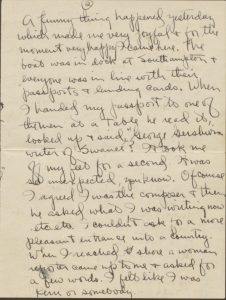George Gershwin was a composer in the early 1900s that was caught up in the culture of celebrity composer. In a letter to his brother Ira, he is excited to announce that he has finally been recognized by a stranger in public as he had just released one of his more successful songs (the musical theater number La-La-Lucille!).

Letter from George Gershwin to Ira Gershwin, February 18, 1923, 60/61, George and Ira Gershwin Collection
At this point in time, Gershwin was enjoying the pop culture phenomenon of celebrity composers. As sheet music was making its way across the US in traveling shows, purchased in staggering numbers1 (Gershwin’s own composition “Swanee” sold well over a million copies), the composer was becoming something of a celebrity2. This seems strange today as we are so well accustomed to singers being the faces of a song— many people are under the impression that they are the sole writer of the song in the first place— but in an era before visual media, the composer was king. Some looking back at history point to the American Songbook as the launch point for composer celebration, as it enjoyed massive commercial success. Indeed even well established performers like Ella Fitzgerald devoted records or albums to composers, a sign of their high culture status3.
Despite their increased visibility it may be argued that celebrity status held composers back in some ways. They became more tied to the commercial success of their music and were more pressured to reproduce previous hits rather than venture into new territory. This is maybe less true of Gershwin and more so of the Tin Pan Alley composers such as Irving Berlin. And this phenomenon didn’t last long— soon rock and roll and other popular genres shifted the focus to the performers and away from the composers. But at this point, we see Gershwin’s excitement over his emerging fame.
1
Epstein, Louis. “Worthless and Priceless: Popular Sheet Music, 1890-1930.” “Worthless and Priceless: Popular Sheet Music, 1890-1930,” 1 Nov. 2023, Northfield Mn, Northfield Mn.
2
Utzig. “The Culture of the Composer.” Medium, Medium, 18 June 2021, utzig.medium.com/the-culture-of-the-composer-8e7f82e9f17a.
3
Micucci, Matt, et al. “The Genius of George Gershwin: Retracing His Legacy in Six Songs.” JAZZIZ Magazine, JAZZIZ, 26 Sept. 2018, www.jazziz.com/the-genius-of-george-gershwin-retracing-his-legacy-in-six-songs/.
